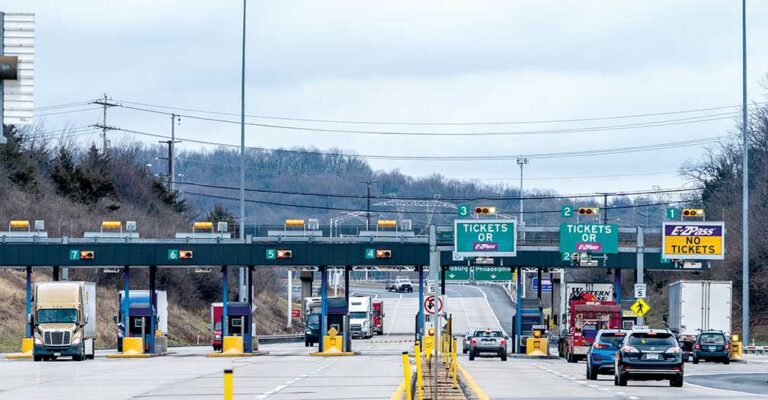There’s no question that technology has changed the trucking industry in numerous ways, including payment methods for toll roads and bridges. Gone are the days when drivers carried enough cash for weeks of toll payments. These days, it’s as simple as driving under a toll gantry — usually without even slowing from highway speeds.
Two primary types of open road tolling are used by tolling authorities, RFID (radio frequency identification) and toll by plate.
By far, the most popular tolling option for carriers is RFID. A transponder unit is required for each vehicle, which communicates with an RFID reader installed at the tolling location. However, the purchase and installation of the transponders can cost more than some carriers are willing to pay.
Tolling by plate requires less of an initial investment because transponders aren’t needed. However, tolling costs can be considerably higher and billing errors more frequent. Smaller carriers whose drivers don’t frequently encounter tolling situations, sometimes choose this route.
Toll management systems like Bestpass, PrePass, and E-ZPass are helping fleet operators untangle the confusion of working with different tolling authorities, and saving companies money at the same time.
“We’ve been involved with Bestpass since it started as the New York State Trucking Association toll on discount program. So, we’re longtime members,” said Ken Johnson, executive chairman of Farmington, New York-based Leonard’s Express. “The best part about it is its simplicity over having to deal with each state individually.”
Luis Guzman, CFO for PGT Trucking, based in Aliquippa, Pennsylvania, expressed similar sentiments.
“We use PrePass for all our tolling and for weigh stations,” Guzman said. “At PGT Trucking, we are 50% company- owned trucks and 50% owner-operators. We have transponders in our company trucks, and then we also offer them to our owner-operators.”
According to Michael DeMateo, PGT’s supervisor of driver support services, the carrier currently has 800 transponders.
“One thing that’s good about PrePass is that we have special reporting that allows us to see whenever, for example, we run the course of a full toll which is a significant amount of money, and we usually almost never do that,” DeMateo said. “They dispute those for us. It would require a lot of work to try to catch that stuff.”
Since toll gantries are usually equipped with photographic equipment and RFID readers, occasionally errors are made in which a truck owner is billed once through the transponder and then again through the plate number. Carriers have even received one invoice for a tractor’s plate, another for the trailer’s plate, and a third for the transponder. Thankfully, those instances are rare. Occasionally, a plate reader will misread a digit in the plate number and automatically generate an invoice to the wrong person or company. Both Bestpass and PrePass have systems that work with tolling authorities to resolve this type of issue.
“We try to work with the toll agencies. Say, you’ve got a problem,” said Joe Clavelle, vice president of business development for Bestpass. “We’ll work to rectify it, because no one wants to get charged twice or three times.”
Helping resolve invoicing issues helps the tolling agency, too.
“We try to work with the local agency and reduce the problem for everyone, because it causes it to cost them money as well,” Clavelle said. “When you have thousands of people phoning in to say, ‘Hey, I was billed three times,’ this is not what they want. It costs that agency time and money to take those calls.”
Reducing expenses is another benefit of using a toll management system. Most tolling authorities offer discounts for using RFID systems, and providers like Bestpass consolidate invoices from multiple agencies into one convenient report. When a carrier receives invoices from several different sources, this increases the risk of missing one, possibly generating late fees or even violations.
“It takes time, and you have to fund each one and deal with all those separate bills,” Clavelle said. “We get comprehensive coverage for the areas traveled.”
It’s also important to discuss the carrier’s running area with the toll management provider.
“It depends on where your fleet operates,” Johnson noted. “New York is offering a better price for a New York-based transponder versus the national one. Other states do that too. So, have the conversation; figure out a solution that’s best for yourself.”
Some tolling jurisdictions offer volume discounts through Bestpass and PrePass that smaller carriers might not qualify for on their own.
“We have buying power where we can buy transactions so that you qualify for a volume rebate you might not get on your own,” Clavelle said. “With the 20% volume rebates — I think to go over some of those bridges in New York is over $100 — so $20 savings on one big truck could be a return on investment right there.”
A white paper available on the Bestpass website shows discounts of up to 75% for some tolling locations.
“Honestly, I can’t imagine running without it — just the headache it would be to manage all those different accounts with the size of our fleet,” DeMateo said. “(It’s good to have) it all on one device and be able to manage it. Offering it to our contractors is in their best interest — and our interests as well.”
Tolling by plate still offers advantages of cash systems (at least at the toll authorities that still accept cash) but isn’t as cost effective as using an RFID system. Still, for carriers that run in areas where toll roads or bridges aren’t prevalent, this option might be the right choice.
For many, however, well-managed RFID tolling can increase route efficiency and reduce operating expenses.
This article originally appeared in the January/February 2024 edition of Truckload Authority, the official publication of the Truckload Carriers Association.
Cliff Abbott is an experienced commercial vehicle driver and owner-operator who still holds a CDL in his home state of Alabama. In nearly 40 years in trucking, he’s been an instructor and trainer and has managed safety and recruiting operations for several carriers. Having never lost his love of the road, Cliff has written a book and hundreds of songs and has been writing for The Trucker for more than a decade.











